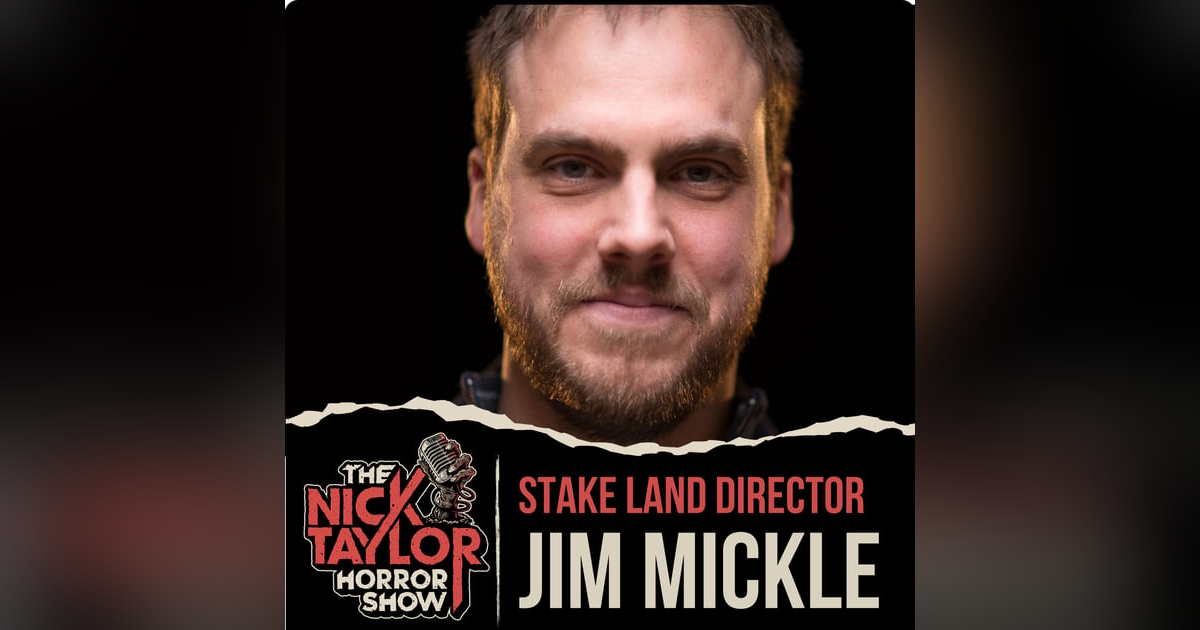Jim Mickle, Director of STAKE LAND, WE ARE WHAT WE ARE & SWEET TOOTH

We got a great one today, someone I’ve wanted to have on the show since year 1. Jim Mickle is in the house. Jim is a director and writer, known for his bold genre-blending style. After graduating from NYU’s film program he made his directorial debut with the micro‑budget horror Mulberry Street (2006), followed by the vampire western Stake Land (2010). In 2013, he released his unsettling family cannibal remake (that legit gave me nightmares) We Are What We Are. Jim then ventured into noir-thriller territory with Cold in July (2014), starring Michael C. Hall and Don Johnson before transitioning to television by co-developing and directing SundanceTV’s Hap and Leonard (2016–2018). He then created, produced, and directed the Netflix fantasy series Sweet Tooth (2021–).
Jim has built a career on doing things his own way — often by learning things the hard way, but always with heart, vision, and grit.
In this episode, Jim dives deep into the evolution of his career — from his early days making guerrilla style films to becoming a Netflix show runner. He discusses how he learned to navigate the TV industry, the painful transition from indie DIY to studio systems, and how the business has transformed for filmmakers over the last 20 years. He also gets into his longstanding mentorship with Larry Fessenden and much more on this very special episode of The Nick Taylor Horror Show.
Key Takeaways
Set the Date — Make a Movie.
Human psychology is complicated, but sometimes it’s very simple. Just the act of picking a shoot date can mean everything. The moment you schedule a day to film something, your mind orients toward a tangible goal and the idea of filmmaking stops being a vague “someday” idea and becomes real, scheduled, and tangible. In 2005, Jim and his longtime collaborator set a hard deadline by which they’d start shooting something—even if it was just the two of them filming in a kitchen. That commitment led to Mulberry Street, a gritty, ultra-DIY feature shot in their own neighborhood with friends and minimal gear. It may not have been perfect—but it was finished. And it launched Jim. Sometimes, all you need to launch a career is a simple commitment in your Google Calendar.
Find Your Fessenden.
Larry Fessenden—who’s been on this show in one of my all-time favorite episodes—is a prolific creator and mentor. Jim credits him as a key figure in his career and someone he reached out to early on for advice. That connection evolved into a long-standing creative partnership: Larry went on to produce several of Jim’s films and helped him navigate both the craft of filmmaking and the maze of Hollywood. More than just a collaborator, Larry became a guiding presence—part mentor, part indie godfather—who shaped Jim’s growth as a filmmaker. Every filmmaker stands to benefit from a relationship like that. So reach out to that filmmaker you really admire because you never know what may happen.
Slow and Steady Wins the Race.
After four indie features, Jim transitioned to television gradually — starting with Hap and Leonard (which nearly crushed him) before eventually helming Netflix’s Sweet Tooth. That slow progression helped him adapt to larger crews, higher stakes, and network politics without losing his creative voice or burning out. Each project taught him how to scale. Jim warns against trying to move too fast.
In the Nat Geo documentary Jaws at 50, Spielberg talks openly about the PTSD he experienced from making Jaws. For years afterward, he’d visit the Universal lot and climb into the actual Orca boat and cry—literally to cry out the trauma he’d been carrying from the experience. He even had nightmares for half a decade. And while the grueling experience of making Jaws turned him into Spielberg, that level of pressure would have destroyed most filmmakers right out of the gate.
Careers should—and often do—progress at the pace of what you can mentally, emotionally and technically handle. Many people enter this industry dreaming of running a big set right out of the gate—but chances are, you’re not ready. You grow into those roles with experience. So embrace the process. Push yourself a little further with each project, but give yourself the time and space to evolve.
Show Notes
Movies Discussed
- Mulberry Street
- Stake Land
- We Are What We Are
- Cold in July
- In the Shadow of the Moon
- Blackout (Larry Fessenden)
- The Orphanage (remake attempt)
- Terrifier
- Talk to Me
- CODA
- Ted Lasso
- Jaws (and related documentary)
TV & Streaming
- Hap and Leonard (Sundance/AMC)
- Sweet Tooth (Netflix)
- Arrow (CW)
- Stranger Things (Netflix)
Books & Resources
- Rebel Without a Crew by Robert Rodriguez
- Joseph Campbell's Hero’s Journey
Follow Jim Mickle at:
- IMBd: https://www.imdb.com/name/nm0585344/:
- Instagram: https://www.instagram.com/mickle_jim/
- X (Twitter): https://x.com/Mickle_Jim
- Facebook: https://www.facebook.com/p/Jim-Mickle-100067127643543/







